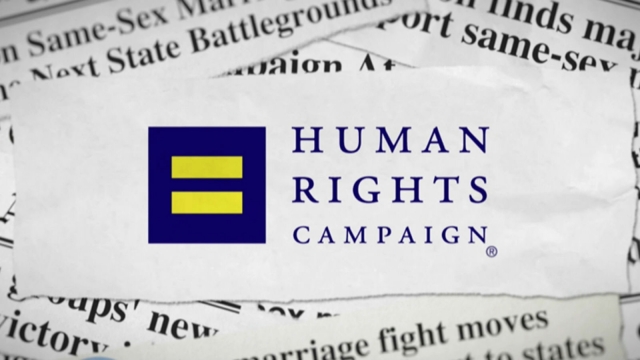True or False? with N.C. Gov. Pat McCrory
True or False? with N.C. Gov. Pat McCrory
HRC on Investigation into Georgia Dept. of Corrections for Unfair Treatment of Trans & Gay Prisoners

Today, HRC released the following statement after news reports that the Department of Justice and the U.S. Attorney for the Northern District of Georgia announced that they have opened a joint investigation into the Georgia Department of Corrections’ (GDC) treatment of transgender and gay prisoners.
“We are pleased to see that the troubling scourge of violence and abuse suffered by transgender and gay inmates in Georgia is finally getting a full investigation by the DOJ. We have long known that transgender people in particular experience unacceptably high rates of abuse and mistreatment while in confinement facilities,” said HRC Legal Director Sarah Warbelow. “As a country, we must do so much more to ensure that inmates do not face inexcusable abuse while they are in confinement.”
The announcement comes after several accusations of abuse against transgender and gay inmates of the GDC. One of the most high profile has been the case of Ashley Diamond, a transgender woman of color, who sued GDC in federal court alleging that the prison failed to stop other inmates from sexually assaulting her, and that she had been denied medical treatment for gender dysphoria. Diamond has entered into a settlement with GDC.
HRC Celebrates Randy Berry’s Anniversary as Special Envoy for the Human Rights of LGBTI Persons

This week marks one year since Randy Berry started as the U.S. State Department’s first ever Special Envoy for the Human Rights of LGBTI Persons.
As Special Envoy, Berry is tasked with leading the State Department’s efforts to protect the human rights of LGBTI people around the world and he has brought a tremendous amount of energy to the position. He has traveled to over 40 countries during the past year and has held hundreds of meetings with international organizations, national government leaders, local governments, law enforcement, civil society, media, business and the general public. His message is simple: LGBT people deserve the same dignity and respect that all people do. While every country may have their own particular views on LGBT issues, there is simply no excuse for violence or persecution of people based on who they are or whom they love.
At the same time, Berry takes a very modest approach to the U.S. role in combating anti-LGBT discrimination and persecution. “We want to be a part of the global movement promoting human rights – not leading it but supporting it,” Berry said.
“Randy’s appointment last year was a game changer for LGBT rights internationally,” said HRC Senior Vice President Mary Beth Maxwell. “It is so powerful to have a senior leader bringing such drive and focus and a human face to the U.S. government’s efforts to protect LGBT people abroad. In conversations with governments, citizens, and advocates, he has opened doors to better understanding and communication of LGBT people and their unique set of concerns. The global equality movement is stronger because we have Special Envoy Randy Berry.”
LGBT communities abroad have welcomed Berry and it is clear that he has had an impact in helping world leaders better understand LGBT human rights and how they can play a role in the global equality movement.
Berry has also overseen the expansion of the Global Equality Fund (GEF), which is a collaborative effort led by the State Department to support and fund programs to advance LGBTI human rights around the world. The GEF has provided more than $24 million in funding to LGBT groups in more than 50 countries.
Berry has worked closely with HRC, speaking at a number of HRC events, including ones on Capitol Hill, to mark IDAHOT, and to kick off HRC’s inaugural Global Innovative Advocacy Summit.
This extraordinary first year has established the Envoy position as an essential part of the U.S. government’s efforts to protect and promote the dignity of all people. It is crucial that it be continued in the next Administration and HRC will work to ensure that his position is firmly established for many years to come, just as HRC advocated for the creation of the position to begin with.
HRC congratulates Randy Berry and the entire State Department LGBTI office on this milestone and their great achievements.
To learn more about HRC’s work around the globe, click here.
Universidad Viña del Mar y Movilh promoverán la no discriminación a través de las artes
Movilh Chile // www.movilh.cl posted a photo:
Un convenio de colaboración llevará por primera vez las muestras de cine con temáticas de la diversidad sexual a la Región de Valparaíso.
Toda la información aquí:
www.movilh.cl/universidad-vina-del-mar-y-movilh-promovera…
Mahogany Storm
WinstonSmith 84 posted a photo:
Mahogany Storm of Boylesque, Toronto. via 500px ift.tt/1V3TvdK
Despite Defeat in Court, LGBT Visibility Continues to Grow in China

Yesterday, a court in China dismissed a man’s request to marry his male partner. While this is a setback for those fighting for equality, LGBT advocates agree that this case has raised the visibility of LGBT people in China. The plaintiff plans to continue his fight in court to marry his partner.
In January, Sun Wenlin filed a case against a civil affairs bureau in Hunan province after his application to marry his male partner was refused. Many activists hailed the acceptance of Wenlin’s case as a momentous occasion for LGBT visibility in China. It was the first time a court had accepted a case of this kind.
At the time, Dan Zhou, a top legal expert and openly gay lawyer based in Shanghai, warned that the case was unlikely to lead to a change in the constitution, which defines marriage as a union between one man and one woman. In a message to HRC, Zhou explained that the Chinese legal system is not based on case law and courts do not have the power to conduct judicial review of the constitutionality of laws.
“The existent political and legal regime in China does not authorize any court at any level to alter the constitution or legislation passed by the National People’s Congress,” Zhou said.
The only way to achieve marriage equality in China would be to pass legislation in the National People’s Congress, which is not on its agenda at the moment. However, high profile cases, such as Wenlin’s, help advance LGBT visibility and empower the movement in its fight for equality.
LGBT people in China are becoming increasingly visible and less marginalized and they are making important social and legal progress. Even though homosexuality is not illegal, it was only removed from the Chinese Classification of Mental Disorders in 2001. LGBT people continue to lack any formal legal recognition or protections from discrimination from families, at school, at work and elsewhere.
More information about the situation for LGBT people in China can be found in our Global Spotlight report LGBT China Today: Surprising Progress yet Daunting Obstacles.
Over 80 Anti-LGBT Bills Pending Across Nation as Arkansas State Legislative Session Begins

HRC has been on high alert this year, tracking nearly 200 anti-LGBT bills across the nation. Even though some state legislatures have already adjourned, more than 80 anti-LGBT bills are still active and several state legislatures are still in session, including Arkansas’s state legislature, which begins this week.
Last year, Arkansas Governor Asa Hutchinson signed legislation that mirrored the federal Religious Freedom Restoration Act. While this legislation replaced the horrific H.B. 1228, it fell short of providing needed non-discrimination protections to all Arkansans. Lawmakers in Arkansas last year also eliminated the power of municipal governments to protect their LGBT residents and visitors from discrimination.
This year, the Arkansas legislative session is restricted to fiscal matters and all eyes are on the fate of the medicaid expansion under the Affordable Care Act, which stands to impact over 200,000 Arkansans.
While it is highly unlikely that religious refusal legislation will be introduced in Arkansas this year, other types of legislation, varying from targeting the rights of transgender people, to eliminating local non-discrimination protections, to explicitly authorizing anti-LGBT discrimination by individuals, businesses and even taxpayer-funded agencies, have been introduced in the neighboring states of Alabama, Missouri, Mississippi and Tennessee.
These bills are part of an onslaught of anti-LGBT bills being pushed this year by anti-equality activists around the country.
To learn more about what lies ahead for equality in your backyard, visit HRC’s newest resource, “Preview 2016: Pro-Equality and Anti-LGBT State and Local Legislation.”
You must be 18 years old or older to chat